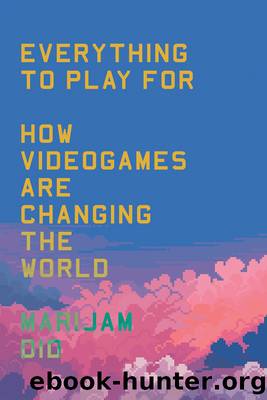Everything to Play For by Marijam Did

Author:Marijam Did
Language: eng
Format: epub
Publisher: Verso Books
Published: 2024-07-30T00:00:00+00:00
Level III: Efficacy
Although gaming communities and the politics brewing in them are under-appreciated subjects, the potential of authored standalone games and their ability to invoke social change is just as great. Such games have the capacity to inform, to subvert, to challenge what is acceptable and round up troops to fight for a better tomorrow. But how?
Unfortunately, the answer is complicated. Many game creators will claim that they are developing socially conscious games. Games concerned with equality, climate change, and other progressive themes are abundant. But apart from being exactly that â socially conscious â are they there to signify certain social attitudes or to change them? Socially aware games are indeed very in vogue. There is no lack of social capital in the field â having a civically concerned theme in your game is catnip for various accolades and overall prestige. âGames for Impactâ and âGames Beyond Entertainmentâ have become awards categories in the most reputable gaming competitions. Games for Change is a nonprofit organisation, handing out influential annual awards in a variety of do-gooder categories. Games like Papers, Please, dissected in Level I, and numerous other ludic projects imply that our ways should be changed, but never quite push the boundaries beyond the comfort zone. These are beloved by games media as a moral palate cleanser, unlike their usual press release copy-pastes and reports on the more unpleasant news from the industry.
Plenty of self-proclaimed political videogame makers genuinely see the primary mission of their work as an appeal for a fairer, kinder world. Presumably that means planting the seeds of change in playersâ minds, inspiring them to become agents for progressive values. Since this result is hard to measure, it remains unclear to what extent videogames help achieve that goal. Too many of them end up as PR exercises for the artist â at best. And at worst, their message can be co-opted, merely sharpening the cynicism around artâs potential for social good. Can progressive games effect actual positive political transformation? What properties should such endeavours require? And what questions should we confront in the search for efficacy â to create games that truly change somebodyâs mind? Or to steer them from inaction into action?
That is not to say that all art must do that â change minds. A great deal of exquisite art reaffirms our beliefs through new forms, enhances our horizons or simply offers temporary relief. These works are not self-defined as political, though, and donât sell as such. Political awareness can be a form of currency in the market, but the results of spreading that awareness are much trickier to quantify. Due to its inherent subjectivity, it is not easy to determine what exactly changes an individualâs mind. At what point does someone encounter a piece of art and change camps politically? While much discussion of videogames in the media is around their perceived role in turning players into reactionary violence machines, the potential for games to introduce more egalitarian ideals is ignored. What type
Download
This site does not store any files on its server. We only index and link to content provided by other sites. Please contact the content providers to delete copyright contents if any and email us, we'll remove relevant links or contents immediately.
The Infinite Retina by Robert Scoble Irena Cronin(6241)
Harry Potter and the Cursed Child: The Journey by Harry Potter Theatrical Productions(4503)
The Sports Rules Book by Human Kinetics(4379)
Molly's Game: From Hollywood's Elite to Wall Street's Billionaire Boys Club, My High-Stakes Adventure in the World of Underground Poker by Molly Bloom(3531)
A Knight of the Seven Kingdoms by George R R Martin(3334)
How To by Randall Munroe(3106)
Flowers For Algernon by Daniel Keyes(3101)
Quidditch Through the Ages by J.K. Rowling(3100)
Quidditch Through the Ages by J K Rowling & Kennilworthy Whisp(2966)
Stacked Decks by The Rotenberg Collection(2880)
Quidditch Through the Ages by Kennilworthy Whisp by J.K. Rowling(2858)
Quidditch through the Ages by J. K. Rowling(2792)
776 Stupidest Things Ever Said by Ross Petras(2775)
Quidditch Through The Ages by J. K. Rowling(2761)
Ready Player One: A Novel by Ernest Cline(2717)
What If?: Serious Scientific Answers to Absurd Hypothetical Questions by Randall Munroe(2700)
Beautiful Oblivion by Jamie McGuire(2602)
The Book of Questions: Revised and Updated by Gregory Stock Ph.d(2567)
Champions of Illusion by Susana Martinez-Conde & Stephen Macknik(2449)
